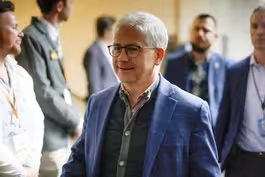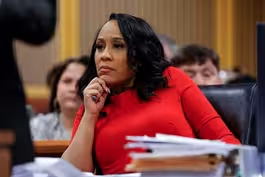
High-profile rape case sparks conversation in France
Clip: 12/19/2024 | 5m 16sVideo has Closed Captions
Scale and brutality of French rape case sparks nationwide conversation
In France, a panel of judges found dozens of men guilty of raping a woman whose then-husband had drugged her unconscious over a decade. The scale and brutality of the abuse prompted thousands to take to the streets and sparked a nationwide conversation about consent. Ali Rogin discussed more with Catherine Porter of The New York Times. A warning: the following conversation is graphic.
Problems playing video? | Closed Captioning Feedback
Problems playing video? | Closed Captioning Feedback
Major corporate funding for the PBS News Hour is provided by BDO, BNSF, Consumer Cellular, American Cruise Lines, and Raymond James. Funding for the PBS NewsHour Weekend is provided by...

High-profile rape case sparks conversation in France
Clip: 12/19/2024 | 5m 16sVideo has Closed Captions
In France, a panel of judges found dozens of men guilty of raping a woman whose then-husband had drugged her unconscious over a decade. The scale and brutality of the abuse prompted thousands to take to the streets and sparked a nationwide conversation about consent. Ali Rogin discussed more with Catherine Porter of The New York Times. A warning: the following conversation is graphic.
Problems playing video? | Closed Captioning Feedback
How to Watch PBS News Hour
PBS News Hour is available to stream on pbs.org and the free PBS App, available on iPhone, Apple TV, Android TV, Android smartphones, Amazon Fire TV, Amazon Fire Tablet, Roku, Samsung Smart TV, and Vizio.
Providing Support for PBS.org
Learn Moreabout PBS online sponsorshipGEOFF BENNETT: In France today, a panel of judges found dozens of men guilty of raping a woman whose then-husband had drugged her unconscious over the course of a decade.
Ali Rogin has more.
And a warning: The following conversation is graphic in its language.
ALI ROGIN: Gisele Pelicot waived her right to a private trial in solidarity with other victims of sexual assault, whom she says go unrecognized.
GISELE PELICOT, Rape Survivor (through translator): By opening the doors to this trial, I wished for society to join in the debates that were held.
I never regretted this decision.
ALI ROGIN: For three months, she has had to sit through videos of her abuse in court taken by her then-husband while dozens of men he recruited online assaulted her.
A majority of these men said they didn't know it was rape, but all of them were found guilty in one way or another.
The scale and brutality of Pelicot's abuse prompted thousands to take to the streets and has sparked a nationwide conversation about consent.
Catherine Porter has been covering the trial for The New York Times.
Catherine, thank you so much for joining us.
What does this verdict mean for the country and for Madame Pelicot?
CATHERINE PORTER, The New York Times: Well, for Madame Pelicot, it was the verdict she was looking for.
But more than the verdict, she wanted to spark a large conversation in France about rape, the prevalence of rape, how the country treats rape victims.
And, by that measure, she's clearly succeeded.
Her trial and her decision to make it public and force the country to look rape in the face by watching these videos of her comatose body being probed and penetrated by strangers has really started a national conversation about relationships between men and women, about consent, about rape culture.
These type of conversations that were much more common in North America and after MeToo, but never really cracked here in France, are now fully taking place.
ALI ROGIN: You have been at the court in Avignon since the beginning.
What has the scene been like?
CATHERINE PORTER: The response to the verdicts -- so, her husband -- or ex-husband, Dominique Pelicot, was found guilty of the maximum, 20 years in prison.
The other men were all convicted mostly of rape, but they were given sentences that were more lenient.
On average, most of them were between six and nine years in prison, and six of them walked free today because they already spent enough time in prison during the trial or before the trial that they had no more prison time.
That infuriated quite a few of the feminists who have been following this case, and very closely, in Avignon.
They said to me that they felt like the message was, you can get away with rape.
ALI ROGIN: Why has this particular case resonated so deeply, not just within France, but really all around the world?
CATHERINE PORTER: I think it's just an extraordinary case for so many reasons.
This was a mass rape trial with 51 men, almost all of whom charged with rape, and all but one for raping the same woman.
In fact, these were people's next-door neighbors.
They range in age between 26 and 72.
The French press were calling them (SPEAKING IN FOREIGN LANGUAGE) Mr. Everyman.
And then there's Madame Pelicot's, frankly, courageous decision to cast a massive spotlight on her own intimate horror.
She not only insisted that the trial be made public because she wanted to launch this conversation, but she then insisted that these videos her husband had taken -- more than 20,000 of them were found by police -- be aired in court, so people could see them.
As her lawyer said, she wanted France and the world to look rape in the eye.
ALI ROGIN: There were so many striking moments during this trial.
What was the response to Madame Pelicot's testimony?
CATHERINE PORTER: Madame Pelicot took the stand early and then frequently throughout the trial, three times.
She was incredibly poised every time, calm.
She said that she thought shame should change sides.
And, truly, she embodied that notion.
She came in each day with her head held high, never cracked emotionally, and answered questions calmly and directly.
And every time one of the lawyers would say, well, you could see how he might have thought, and she said, well, the instant came into the room and he saw my body and heard my snores, he should have known to ask Madame Pelicot.
And he should have turned around and left and called the police.
And not one of these 50 men phoned the police.
ALI ROGIN: A stunning trial, with the verdict coming today.
Catherine Porter, who's been covering it since the beginning, thank you so much for joining us.
CATHERINE PORTER: Thank you for having me.
Farms face calls to protect workers as virus spreads in cows
Video has Closed Captions
Clip: 12/19/2024 | 8m 29s | Colorado dairy farms face calls to keep workers safe as bird flu spreads among cows (8m 29s)
Leading researcher on viewing addiction as a brain disorder
Video has Closed Captions
Clip: 12/19/2024 | 6m 41s | Leading researcher explains how viewing addiction as a brain disorder improves treatments (6m 41s)
A look at legal tactics Trump is using against media outlets
Video has Closed Captions
Clip: 12/19/2024 | 5m 58s | A look at the legal tactics Trump is using against media outlets (5m 58s)
Rep. McHenry on Washington dysfunction as he leaves Congress
Video has Closed Captions
Clip: 12/19/2024 | 7m 17s | GOP Rep. McHenry gauges Capitol Hill dysfunction as he leaves Congress after 20 years (7m 17s)
What was in the rejected GOP proposal to avoid a shutdown
Video has Closed Captions
Clip: 12/19/2024 | 5m 52s | What was in the rejected GOP proposal to avoid a government shutdown (5m 52s)
Willis disqualified from Trump's Georgia interference case
Video has Closed Captions
Clip: 12/19/2024 | 3m 58s | Prosecutor Fani Willis disqualified from Trump election interference case in Georgia (3m 58s)
Providing Support for PBS.org
Learn Moreabout PBS online sponsorship
- News and Public Affairs

FRONTLINE is investigative journalism that questions, explains and changes our world.

- News and Public Affairs

Amanpour and Company features conversations with leaders and decision makers.












Support for PBS provided by:
Major corporate funding for the PBS News Hour is provided by BDO, BNSF, Consumer Cellular, American Cruise Lines, and Raymond James. Funding for the PBS NewsHour Weekend is provided by...






